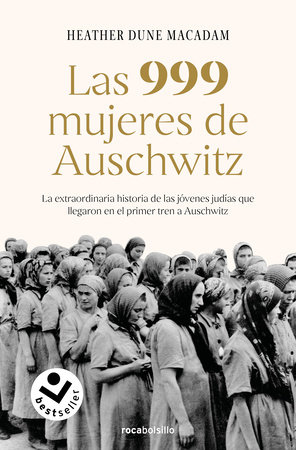Una increíble historia de amistad, sororidad y supervivencia. La historia de las primeras 999 mujeres judías que fueron enviadas al campo de exterminio.
«Todo comenzó con las chicas», dice Giora Amir, de 91 años.
El 25 de marzo de 1942, cientos de jóvenes mujeres judías y solteras abandonaron sus hogares para subir a un tren. Estaban impecablemente vestidas y peinadas, y arrastraban sus maletas llenas de ropa tejida a mano y comida casera. La mayoría de estas mujeres y niñas nunca habían pasado ni una noche fuera de casa, pero se habían ofrecido voluntariamente para trabajar durante tres meses en época de guerra. ¿Tres meses de trabajo? No podía ser algo tan malo. Ninguno de sus padres habría adivinado que el gobierno acababa de vender a sus hijas a los nazis para trabajar como esclavas. Ninguno sabía que estaban destinadas a Auschwitz.
Los libros de historia han podido pasar por alto este hecho, pero lo cierto es que el primer grupo de judíos deportados a Auschwitz para trabajar como esclavos no incluía a combatientes de la resistencia, ni a prisioneros de guerra, no. No había ni un solo hombre prisionero en esos vagones de ganado. Era un tren de 999 chicas solteras, vendido a la Alemania nazi por una dote de 500 Reich Marks, el equivalente a 200 euros.
Sabemos que la historia está escrita por el vencedor. Casi todas las figuras poderosas en ambos lados de este conflicto eran hombres. Estas 999 mujeres jóvenes fueron consideradas indignas e insignificantes, no sólo porque eran judías, sino también porque eran mujeres. Estas chicas eran peones en un gran plan de destrucción humana, pero frustraron ese plan al sobrevivir y dejar su testimonio a sus familiares.
Este libro da voz a esas mujeres y niñas que la historia olvidó.
ENGLISH DESCRIPTION
A PEN America Literary Award Finalist
A Goodreads Choice Awards Nominee
An Amazon Best of the Year Selection
The untold story of some of WW2’s most hidden figures and the heartbreaking tragedy that unites them all. Readers of Born Survivors and A Train Near Magdeburg will devour the tragic tale of the first 999 women in Auschwitz concentration camp. This is the hauntingly resonant true story that everyone should know.
On March 25, 1942, nearly a thousand young, unmarried Jewish women, many of them teenagers, boarded a train in Poprad, Slovakia. Believing they were going to work in a factory for a few months, they were eager to report for government service and left their parents’ homes wearing their best clothes and confidently waving good-bye. Instead, the young women were sent to Auschwitz. Only a few would survive. Now acclaimed author Heather Dune Macadam reveals their stories, drawing on extensive interviews with survivors, and consulting with historians, witnesses, and relatives of those first deportees to create an important addition to Holocaust literature and women’s history.








